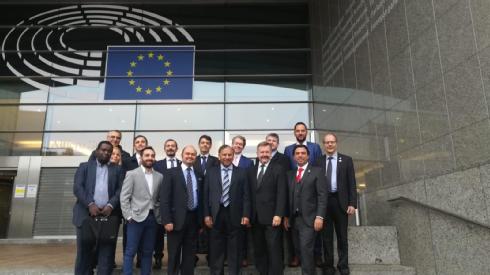Future of Biomedical engineering discussed in Brussels today
- · A meeting organised by Dr Leandro Pecchia, of the School of Engineering at the University of Warwick
- · By 2020 they want to have biomedical engineers and clinical engineering as an independent profession – they would look after all the medical devices in the hospital
- · Aims to harmonise regulations on medical devices in Africa
The future of Biomedical Engineering (BME) was the focus in Brussels today (11/10/2019) by the European Parliament Interest Group (EPIG) - they are looking at the future of medical equipment and how to regulate hospitals in Africa.
The most influential BME representatives from 4 continents: Europe, USA, Africa and Asia met in Brussels today to discuss how to maximally profit from the BME community in-puts while design the forthcoming European framework for research, and how to harmonise international regulation on medical devices and medical settings across there continents.
The Warwick Biomedical Engineering group, in the School of Engineering at the University of Warwick had a key role in the organisation of this event, as Dr Leandro Pecchia, drafted the agenda as Chair of the European Alliance of Medical and Biological Engineering and Science (EAMBES) he comments:
"This event is an important milestone towards the recognition of BME, in the best interest of patients. Creating dedicated panels for BME in ERC (European Research Centre) and FET (Future and Emerging Technologies) is essential to maintain EU research competitiveness in the field. USA and Singapore did it and now are leading the basic research in this field. Finally, harmonisation of hospital and device regulations between Africa and Europe is a must.
“The USA and China have created committees that are working proactively on this on Africa. Harmonisation paves the way to manufactures if medical devices, which are mainly SMEs (Small to Medium Enterprises) in Europe. The African market of medical devices is growing 10% per year - Does Europe want to be there in 5 years or not?"
Dr Leandro Pecchia discusses the need to give Biomedical Engineering independent space in the forthcoming Horizon 2020 Europe.
As well as why it is important to recognize BME and Clinical Engineering as an independent profession, as maintenance of the machines is essential for patient care.
He also says how Africa need support, by helping them in harmonizing regulations on medical devices and medical settings (i.e. hospitals) with the EU. This will facilitate EU SMEs in entering the Africa medical device market - the only one that is growing fast at 10% growth per year, and will also help African economy further.
Currently we donate devices hoping to help, but those devices in African hospitals can be not-safe, because of poor hospital conditions.
By the end of the day they will have discussed what the future of biomedical engineering will be, in terms of new technologies, maintaining current machines in hospitals and regulating the hospitals in Africa to help their economy as well as health.
ENDS
11 OCTOBER 2018
NOTES TO EDITORS
Image Available at: https://warwick.ac.uk/services/communications/medialibrary/images/september2018/brussels.jpg
For further information please contact:
Alice Scott, Media Relations Manager - Science, University of Warwick
Tel: 02476 574 255 or 07920531221
E-mail: alice.j.scott@warwick.ac.uk
For further information please contact:
Alice Scott, Media Relations Manager - Science, University of Warwick
Tel: 02476 574 255 or 07920531221
E-mail: alice dot j dot scott at warwick dot ac dot uk
